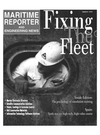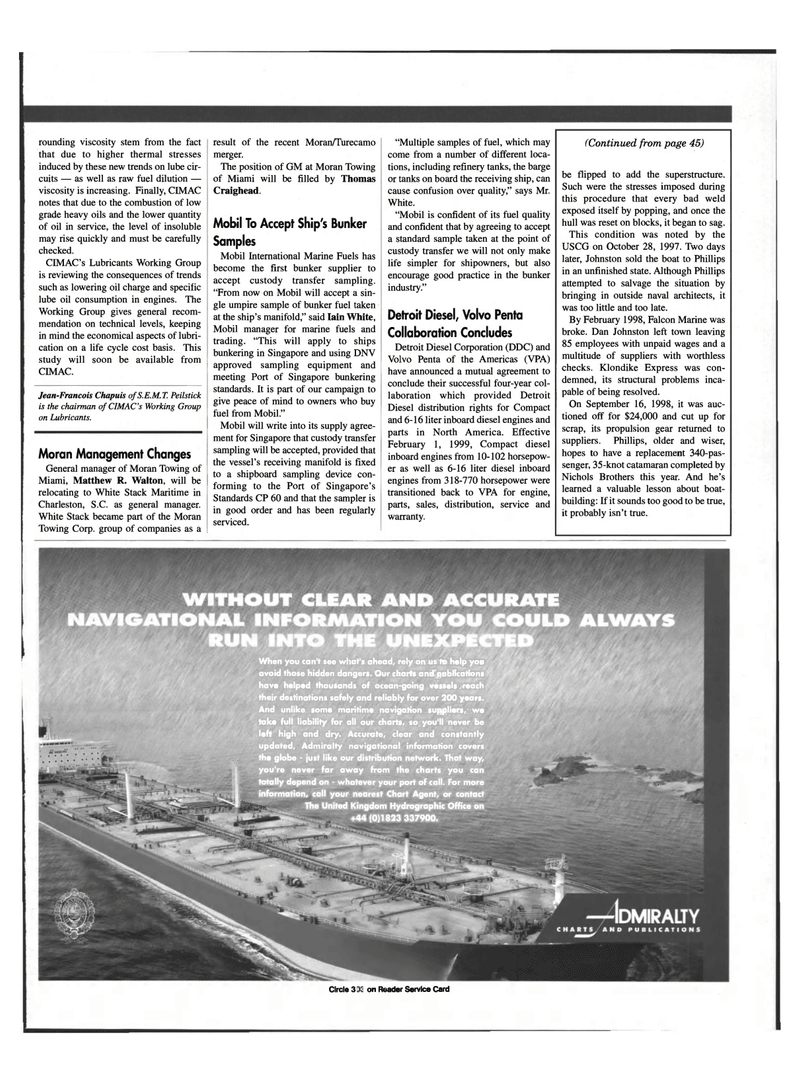
Page 47: of Maritime Reporter Magazine (March 1999)
Read this page in Pdf, Flash or Html5 edition of March 1999 Maritime Reporter Magazine
rounding viscosity stem from the fact that due to higher thermal stresses induced by these new trends on lube cir- cuits — as well as raw fuel dilution — viscosity is increasing. Finally, CIMAC notes that due to the combustion of low grade heavy oils and the lower quantity of oil in service, the level of insoluble may rise quickly and must be carefully checked.
CIMAC's Lubricants Working Group is reviewing the consequences of trends such as lowering oil charge and specific lube oil consumption in engines. The
Working Group gives general recom- mendation on technical levels, keeping in mind the economical aspects of lubri- cation on a life cycle cost basis. This study will soon be available from
CIMAC.
Jean-Francois Chapuis ofS.E.M.T. Peilstick is the chairman of CIMAC's Working Group on Lubricants.
Moran Management Changes
General manager of Moran Towing of
Miami, Matthew R. Walton, will be relocating to White Stack Maritime in
Charleston, S.C. as general manager.
White Stack became part of the Moran
Towing Corp. group of companies as a result of the recent Moran/Turecamo merger.
The position of GM at Moran Towing of Miami will be filled by Thomas
Craighead.
Mobil To Accept Ship's Bunker
Samples
Mobil International Marine Fuels has become the first bunker supplier to accept custody transfer sampling. "From now on Mobil will accept a sin- gle umpire sample of bunker fuel taken at the ship's manifold," said Iain White,
Mobil manager for marine fuels and trading. "This will apply to ships bunkering in Singapore and using DNV approved sampling equipment and meeting Port of Singapore bunkering standards. It is part of our campaign to give peace of mind to owners who buy fuel from Mobil."
Mobil will write into its supply agree- ment for Singapore that custody transfer sampling will be accepted, provided that the vessel's receiving manifold is fixed to a shipboard sampling device con- forming to the Port of Singapore's
Standards CP 60 and that the sampler is in good order and has been regularly serviced. "Multiple samples of fuel, which may come from a number of different loca- tions, including refinery tanks, the barge or tanks on board the receiving ship, can cause confusion over quality," says Mr.
White. "Mobil is confident of its fuel quality and confident that by agreeing to accept a standard sample taken at the point of custody transfer we will not only make life simpler for shipowners, but also encourage good practice in the bunker industry."
Detroit Diesel, Volvo Penta
Collaboration Concludes
Detroit Diesel Corporation (DDC) and
Volvo Penta of the Americas (VPA) have announced a mutual agreement to conclude their successful four-year col- laboration which provided Detroit
Diesel distribution rights for Compact and 6-16 liter inboard diesel engines and parts in North America. Effective
February 1, 1999, Compact diesel inboard engines from 10-102 horsepow- er as well as 6-16 liter diesel inboard engines from 318-770 horsepower were transitioned back to VPA for engine, parts, sales, distribution, service and warranty. (Continued from page 45) be flipped to add the superstructure.
Such were the stresses imposed during this procedure that every bad weld exposed itself by popping, and once the hull was reset on blocks, it began to sag.
This condition was noted by the
USCG on October 28, 1997. Two days later, Johnston sold the boat to Phillips in an unfinished state. Although Phillips attempted to salvage the situation by bringing in outside naval architects, it was too little and too late.
By February 1998, Falcon Marine was broke. Dan Johnston left town leaving 85 employees with unpaid wages and a multitude of suppliers with worthless checks. Klondike Express was con- demned, its structural problems inca- pable of being resolved.
On September 16, 1998, it was auc- tioned off for $24,000 and cut up for scrap, its propulsion gear returned to suppliers. Phillips, older and wiser, hopes to have a replacement 340-pas- senger, 35-knot catamaran completed by
Nichols Brothers this year. And he's learned a valuable lesson about boat- building: If it sounds too good to be true, it probably isn't true.
When you can't see what's ahead, rely on us to help you avoid those hidden dangers. Our charts and publications have helped thousands of ocean-going vessels reach their destinations safely and reliably for over 200 years.
And unlike some maritime navigation suppliers, we take full liability for all our charts, so you'll never be left high and dry. Accurate, clear and constantly updated, Admiralty navigational information covers the globe - just like our distribution network. That way, you're never far away from the charts you can totally depend on - whatever your port of call. For more information, call your nearest Chart Agent, or contact
The United Kingdom Hydrographic Office on +44 {0)1823 337900.
Circle 312 on Reader Service Card 49

 46
46

 48
48
